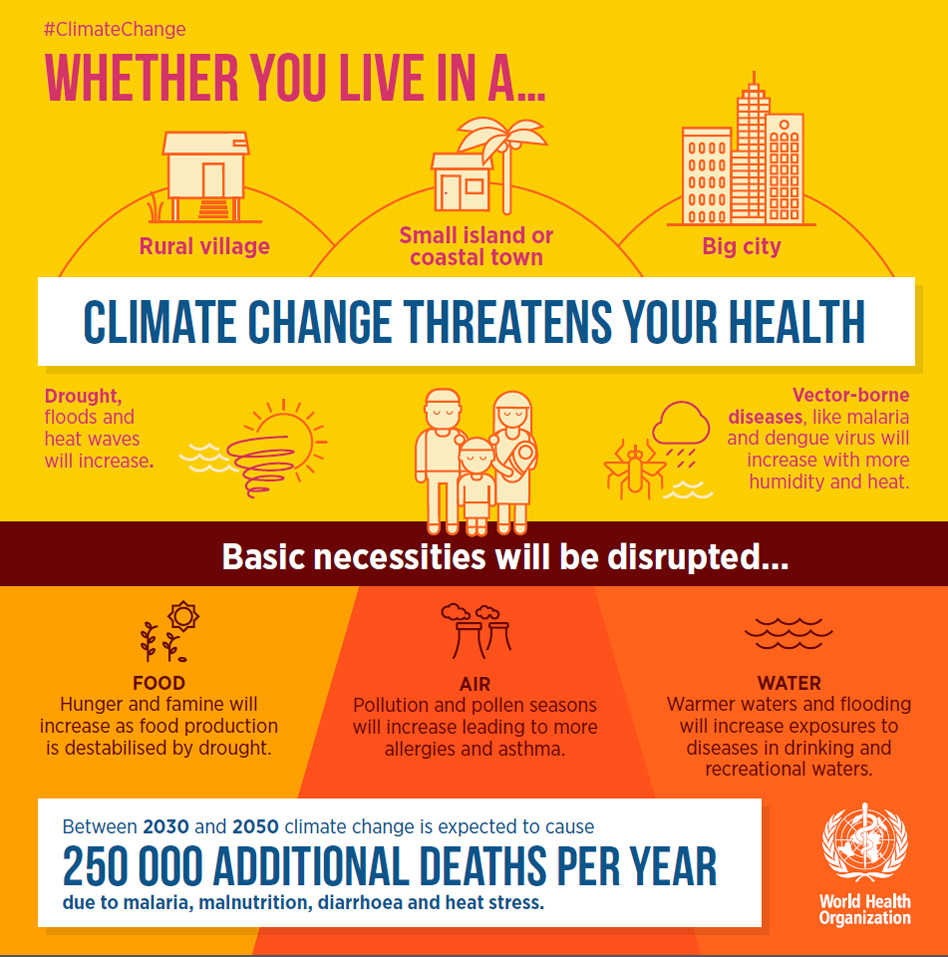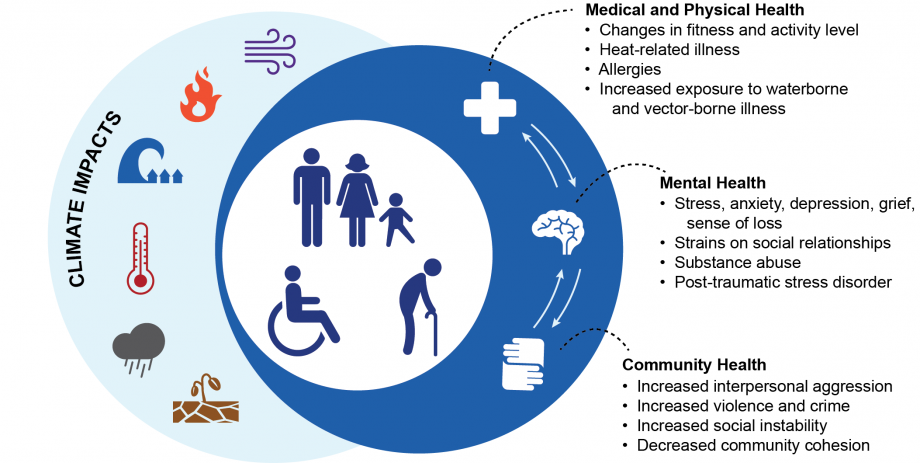 We make our health across many dimensions: via nutrition, safe physical/built environments, financial wellness, education, and the environment among them. In this last category, the environment, new research finds that climate change has a significant impact on health.
We make our health across many dimensions: via nutrition, safe physical/built environments, financial wellness, education, and the environment among them. In this last category, the environment, new research finds that climate change has a significant impact on health.
The report, Mental Health and Our Changing Climate: Impacts, Implications, and Guidance, was sponsored by the American Psychological Association in conjunction with Climate for Health and ecoAmerica.
“Climate change-induced severe weather and other natural disasters have the most immediate effects on mental health in the form of the trauma and shock due to personal injuries, loss of a loved one, damage to or loss of personal property or even the loss of livelihood,” which often results in post-traumatic stress disorder.
Beyond disasters, changes in climate negative impact agriculture, infrastructure and livability, the report calls out. The loss of control and helplessness can translate into high levels of stress and anxiety, which link to physical health outcomes such as weakened immunity. At the community level, climate change has been seen to impact interpersonal and intergroup aggression and loss of social identity and cohesion. Communities that depend in particular on industries directly impacted by climate change can be especially hard on indigenous communities.
The APA and colleagues recommend several strategies to ameliorate the negative impacts of cli mate change on mental health:
mate change on mental health:
- Develop public policies that bolster social networks in communities, both off-line (in-real-life, IRL) and online. That’s because a resilient social support system is associated with lower rates of psychological distress.
- Develop transportation and town planning policies that promote cycling and walking in neighborhoods and to workplaces, along with supporting public transportation which increases community cohesion and reduces stress through private commuting in cars in heavy traffic times (rush hour).
- Support individual health by fostering optimism, cultivating active coping and self-regulation skills
- Expand community mental health infrastructure
- Reduce disparities and attend to populations of concern
- Engage and train community members to respond.
Individuals can also take on self-care strategies, such as:
- Make and practice household emergency plans
- Participate in cognitive mindset training to prepare for adversity and adaptation
- Care for oneself with healthy habits
- Connect with family, friends, neighbors and others to build strong social networks.
Psychological impacts of climate change may not be obvious, the APA realizes. However, they are still serious because they can lead to behavioral disorders from anxiety and depression to antisocial behavior and suicide. The APA suggests we view these impacts as seriously as we consider disease and hunger.
Health Populi’s Hot Points: Climate change threat ens human health: medical and physical, community, and mental, as illustrated in the second diagram.
ens human health: medical and physical, community, and mental, as illustrated in the second diagram.
The second graphic comes from The Impacts of Climate Change on Human Health in the United States, published in 2016 by the U.S. Global Change Research Program. The USGCRP Program is a joint effort of 13 U.S. Federal agencies committed to research, science, education and action on climate change in America.
These agencies are the Department of Agriculture, Department of the Interior, Department of Health and Human Services, U.S. Agency for International Development, Smithsonian Institution, Department of Commerce, Department of Defense, National Aeronautics and Space Administration (NASA), Department of Energy, the Environmental Protection Agency, the National Science Foundation, Department of Transportation, and the Department of State.
The program has oversight by the White House Office of Science and Technology Policy.
In today’s New York Times, you can read an article online titled, “Trump Leaves Science Jobs Vacant, Troubling Critics.” (The print version in my newspaper is, “Unease Among Scientists as Desks Stand Empty in White House Technology Office,” providing further detail about the theme). There have been “scores” of departures of scientists and Silicon Valley technology experts, the article observes, leaving us to wonder whether the delay is a hiring lull or a “shift in emphasis,” NY Times posits. Vinton Cerf, VP of Google and an Internet pioneer, is quoted saying that the dwindling of the White House science and tech staff could have long-term consequences.
As U.S. policymakers and health citizens continue to debate and dialogue what health reform could look like in 2017, the social determinants of health — and in this case, environmental quality and climate change’s impact on all aspects of human health — should be kept front-and-center. That 13 Federal agencies are involved in this effort is evidence that some very smart people, across the Federal government, understand the macro-impact of climate change on American lives and, ultimately, national security in an unstable world.




 Thank you FeedSpot for
Thank you FeedSpot for